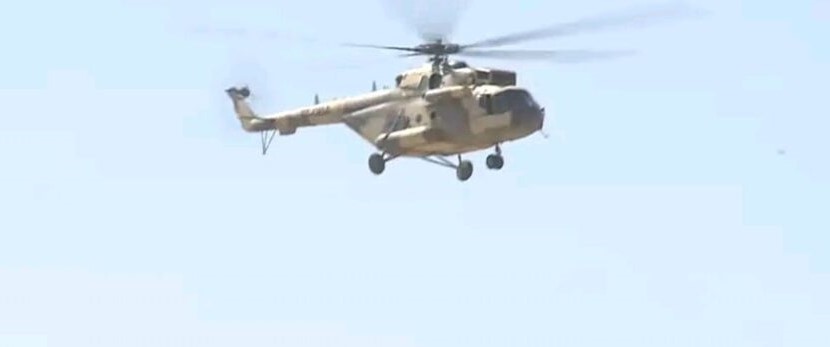A UN Panel of Experts has raised concerns over the airworthiness of helicopters suspected to have been used in recent attacks by the South Sudan People’s Defense Forces (SSPDF).
In a final report to the Security Council seen by Radio Tamazuj, the Panel questioned how Mi-24 attack helicopters could remain operational despite the arms embargo imposed under UN Security Council Resolution 2428 (2018).
The report noted that Mi-24 helicopters require frequent maintenance and a steady supply of spare parts, particularly for oil circuits, engines, and gearboxes. Occasional replacements of rotor and tail blades are also necessary.
“After any additional ground units have been cannibalized for parts, this would require the international procurement of spare parts, as well as ongoing maintenance assistance. South Sudan has not sought any exemptions to the arms embargo relating to the maintenance of its helicopter fleet,” the report stated.
It further revealed that at least two of the SSPDF’s Mi-24 helicopters had been regularly active over the past year, including during recent violence in Upper Nile State.
“Of the three Mi-24 helicopters stationed at Juba airport, one left its station around October 20, 2024, November 13, 2024, January 17, 2025, and between January 31 and February 7, 2025. A second departed between February 14 and 18, 2025,” the report said.
On October 20, 2024, one of the helicopters that left Juba was spotted in Bor following an unplanned landing. It was equipped with a B8V20 rocket launch pod.
Satellite imagery and local observers confirmed that after two Mi-24 helicopters left Juba in February 2025, one was seen in Malakal, Upper Nile State, on February 17, 2025, and two were observed there on February 24, 2025.
South Sudan has not requested exemptions to the arms embargo for helicopter maintenance.
The report indicated that some, if not all, of South Sudan’s Mi-24 helicopters were initially supplied by Ukrainian entities before the 2018 arms embargo. One contract, finalized on December 31, 2016, involved Ukrainian firm Motor Sich JSC delivering three Mi-24V-MSB127 helicopters to South Sudan’s Ministry of Defence and Veterans Affairs around 2014. A second contract, concluded on December 31, 2017, between Ukraine’s Promoboronexport and Ugandan company Bosasy Logistics Ltd, covered the delivery of four Mi-24V helicopters, two of which were confirmed to have been transferred to South Sudan.
Ukrainian authorities confirmed that no Ukrainian companies had supplied parts or provided maintenance for the helicopters in the decade since delivery, nor since their service contracts expired seven years ago.
The State Export Control Service of Ukraine stated that it had not issued any permits for transfers of goods to or from South Sudan since 2016. Ukrainian officials also confirmed that no spare rotor or tail blades had been supplied by Ukrainian companies beyond those originally fitted on the three Mi-24V-MSB helicopters. Those fitted to the Mi-24V were provided by Bosasy Logistics Ltd, which also supplied additional spare parts at the start of the contract.
The Panel also identified two foreign nationals as crew members of the helicopter that made an unscheduled landing in Bor on October 20, 2024. Under paragraph 4 of UN Security Council Resolution 2428 (2018), renewed by Resolution 2731 (2024), foreign nationals are prohibited from providing technical assistance related to military activities or the maintenance of arms and related materiel.
The Panel made several recommendations, including urging the Security Council Committee to encourage all parties to the 2018 Revitalized Agreement on South Sudan to uphold the ceasefire, expedite the unification of security forces, complete the training and deployment of the Necessary Unified Forces, and condemn attacks on UNMISS assets and humanitarian personnel.
It also recommended that neighboring states be asked to assess their efforts in inspecting cargo bound for South Sudan, particularly regarding aeronautical parts that could be used for military helicopters.
Additionally, the Panel suggested urging conflict parties in Sudan to prevent weapons transfers to South Sudan and called for vigilance by customs authorities worldwide regarding timber or charcoal imports from South Sudan and neighboring states due to fraudulent documentation risks.
Further recommendations included a joint consultation between relevant UN Security Council sanctions committees and an update to narrative summaries for individuals and entities on the sanctions list based on new information in the report.
The Panel of Experts was established under UN Security Council Resolution 2206 (2015) and its report was considered by the Committee on July 1, 2025.




